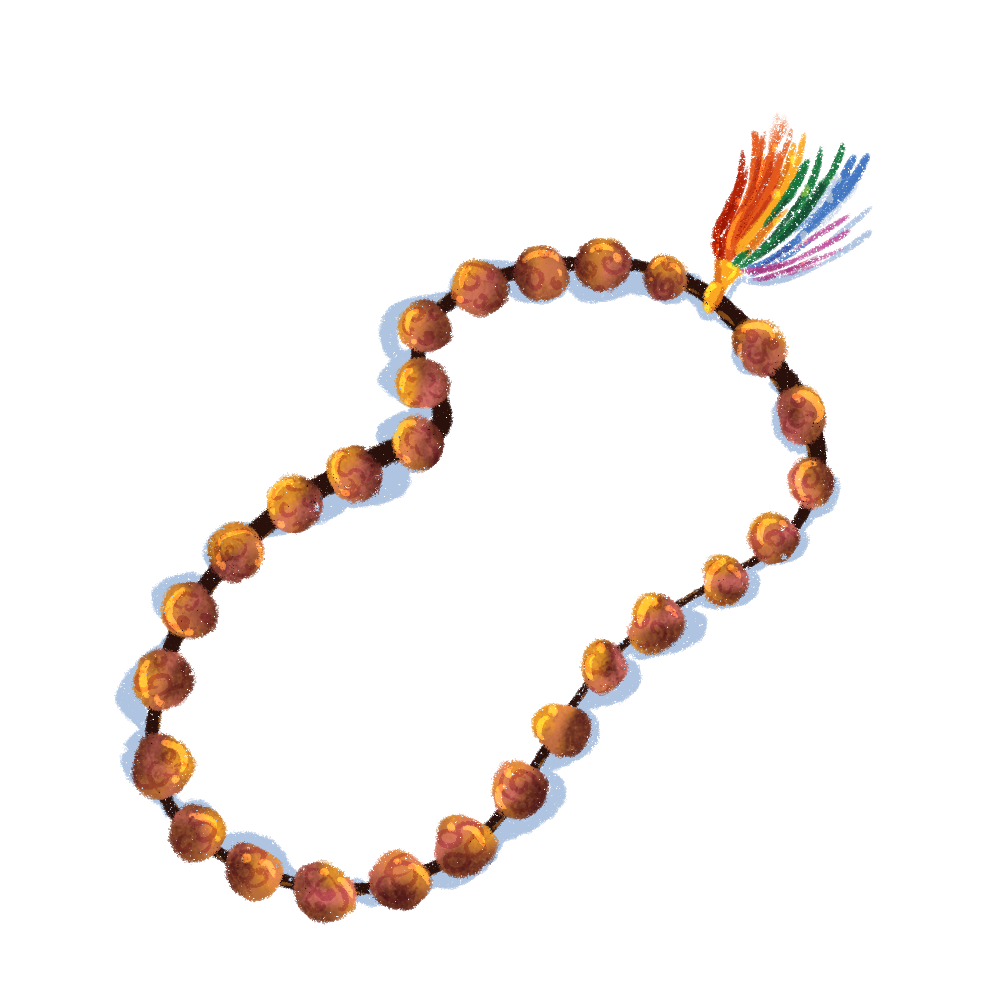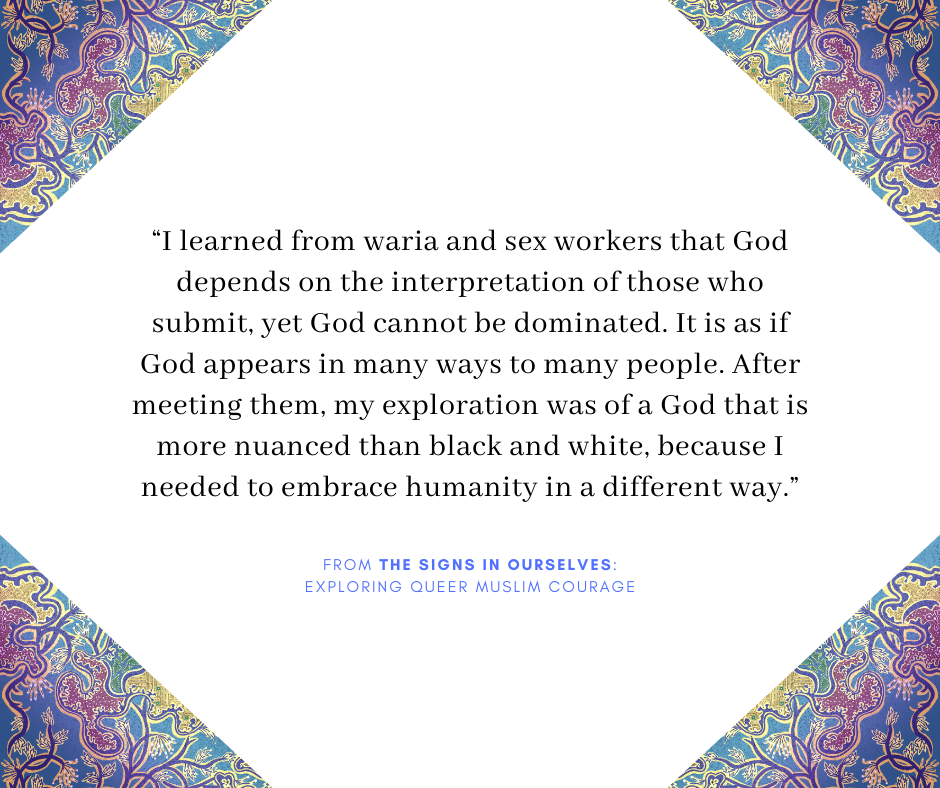Connecting truth and the Divine (The Signs In Ourselves, Part 4 of 12)
In this part, a lesbian confronts her internalised homophobia, a loving mother prays with her trans son in an Islamic boarding school, and a waria community teaches a conservative man something about God.

In this part, a lesbian confronts the extent of her internalised homophobia, a loving mother prays with her trans son in an Islamic boarding school, and a community of waria teach a conservative man something about God. Lastly, we share answers from others about their relationship with prayer, before jumping in the next part into Exercise 4.
- Navigating internalised homophobia
- Navigating transition and affirmation
- Discovering the God of the marginalised
- Praying TO change vs. Praying FOR change

NAVIGATING INTERNALISED HOMOPHOBIA
She grew up thinking of the angels on her shoulders. “I used to believe God existed in the sky when I was small. My family would remind me: What God wants is for me to learn to read the Quran, pray, fast, not argue with my parents. Also to say Bismillah before I eat. Don't do bad things, don't steal, don't go out and play in the middle of the night, be kind to your siblings. If not, God will be angry. My grandparents told me my actions were written by Raqib and Atid who were on my shoulders. If I thought of something bad but did not do it, it wouldn't be written. But if I intended to do good, it would be written right away. As a child when I wanted to get up to no good, I would look at my left shoulder and say "Don't write this, okay?"
She realised she wasn’t straight when she was 14, a teenager at an all-girls school. “So many of us were very close, but didn't have any language for it. Why is it that we’d only sit with each other at school, call each other after school and spend hours on the phone, and get jealous of other friends? We had no words for it. Any sex ed in Islam about husband-wife relations made me uncomfortable. Everything I knew about religion at the time said being myself was haram. I tried to change myself, tried to like boys, because I thought God would not like me as I was. It was a feeling that lived in me for many years. I grew up in that feeling.”
Her internalised struggle externalised into targeting other lesbian Muslims for conversion therapy. “I was recruited by the Islamist political party in north-east Malaysia to find lesbians in local universities, something they trained me to do since I was 16. There were maybe 14 of us on campus. I was heavily involved in their activities, and later also in my university's religious faculty. Every week we would have a study circle and I would use that opportunity to identify lesbians. I exposed a few of my friends. They were forced into religious camping trips and conversion therapy.”
Eventually, the realities of her actions led her to a crisis of faith. “It was only so long before I had to force myself to look at the contradictions within me versus what I heard everyday, with what I was doing too! I was deeply closeted and homophobic. Everywhere I looked, I could not find where God says that I am supposed to be okay with myself. If God loved me, why test me with something I could not change? I knew the Qur’an said Allah would not test me with something I could not handle. But this is my identity, my sexuality— how could I change that? I didn't want anything to do with the religion anymore. I rebelled by literally showing everyone my face. I took off the full veil and even wore jeans, deep in the feeling that God was pissed off with me anyway— so why not take it the whole way? Of course I got called in by the ones who recruited me and was kicked out of my community. And with that, I renounced being a part of whatever the majority called faith at the time.”
Although she lived out days that seemed conventional, she spent her evenings connecting her truth to the Divine. “I married a man, had children, got divorced. I worked throughout. When I had time to myself at the end of the day, I would spend it looking for the truth. I tried years before, but couldn't find anything. So I tried again after all of that, as sincerely as I could. I asked Allah over and over: If what I am looking for is true, if what I am is true, please show me the way as widely as You can. So I reread hadith, ones I had encountered about death to LGBTs, reread interpretations, I questioned their sources and intentions. At some point, I encountered the works of Scott Kugle, Reza Aslan, and verses in Surah Luqman and Surah Yusuf.”
Decades after her teenage recruitment, she is now in Muslim study circles again, but this time with a different perspective and a partner for life. “I don't blindly follow any person anymore, and I am always willing to unlearn and relearn when I discover more knowledge. I know that all my knowledge is still a drop in the sea. But every sea has many shores, and to pretend there is only one view of the ocean is to be a blind follower. Detaching myself from being so fiqh-based changed my life. I found a loving life partner who supports me and the children. We’ve been together for 9 years. She and I run an underground halaqah together for queer Muslim women. When I ask friends of mine if they have met any other queer Muslims who are comfortable with themselves, they tell me ‘Only the both of you.’ It seems sad right? I think there are more out there. We just haven’t met them yet.”



NAVIGATING TRANSITION AND AFFIRMATION
He grew up the daughter of a family who ran an Islamic boarding school, surrounded by a social culture oriented towards the Divine. “A lot of Islamic boarding schools exist here in Indonesia called pesantren. Students tend to both live and learn there, so we all become very close. My understanding of it is related to how I see God: culturally, in family relationships, our pesantren’s students, the neighbourhood, which is majority Muslim. My understanding of God makes most sense to me when I see people live it culturally, rather than only in prayer.”
After the parents passed away, he helps his siblings run the school. “I live in a small city much like other cities in Indonesia, and it’s a student city of many small pesantren. I live with my family. We have our own pesantren— a very small one with 50 students. A daily routine here is pretty much about learning Islam. We learn grammatical Arabic but we also do cultural ceremonies where we recite and read Prophet Muhammad’s biography with local music instruments (rebana). We learn public speaking and how to converse with our peers about religion. I live deep in that culture and daily routine. Sometimes I also teach English here.”
His high school years in another pesantren left him uncertain about his understanding of God. “When I was in high school, I went to a pesantren in another city for three years. In Indonesia we have pesantren Quran, designed for students to memorise the Quran, and then there’s pesantren kitab— like my family’s— which focuses on the study of classical texts and critical thinking, and debates. People are used to differences of opinion in pesantren kitab, and contemplate different resources. When I was in the pesantren Quran for three years, it was like their teachings were the only interpretations that were valid. I was afraid of myself. I guess I became briefly disconnected with my own understandings of Islam and God during this time. Because I grew up with all these Muslim cultural activities in my family, I saw people, not really God. I see the beauty of our people and our warmth. I loved the connection between us when we gather and celebrate religious activities. But I didn’t connect this to my own understanding of religion and God, which totally changed when I went back home after graduating high school and college.”
When he met Muslims who helped him reconcile his faith with justice and gender equality, he began exploring his queer identity with the support of his parents. “Queer people are often forced to meet ustazes and ustazahs who are very queerphobic. But somehow I met religious leaders who taught me about equality in Islam. They taught me about the Divine with a more positive approach, incorporating justice and gender equality. I remember being in Jakarta for an interfaith community meeting, and I encountered an ulama, Kyai Husein Muhammad, who really moved me. He said that God doesn’t see your gender or your racial identity. What God sees in you is your taqwa, the deeds you do when you are practicing your faith. This Kyai (pesantren leader) writes many books on gender equality, Islam, and women. He helped me understand Islam with through a Sufism framework, I enjoy his lectures. His work and others have really changed the way I see God and religion. When I realised God doesn’t see me as male or female, I started to explore my queer identity.”
Since the death of his beloved mother, he prays alone in a separate building, despite family acceptance. "I have been praying away from my community for five years now, since I started my transition. When my mother was alive, we would pray together. I was mostly by her side taking care of her. She was an ustazah, though we have another word for it in my village. I used to accompany her during her public teachings with the local people. Although my family has already accepted me as a trans man, I realise not all people at the school feel comfortable about me praying together with them. But my mother was the only person who was open to me that way. She changed my name on her phone, and always invited me to pray with her. We prayed in my room in a separate building. I would lead her, or she would lead me. Now I pray by myself, even though I want a sense of belonging in my society. That’s my biggest challenge. Sometimes I go to cities where no one knows me and pray in a mosque there. Luckily our pesantren has many other activities that are less formal than prayer. For example, I can still be with everyone in other Islamic cultural activities like singing stories of the Prophet with the rebana. There are more mixed activities than segregated ones.”
He discovered a relationship with God is not a quest with a gate you walk through, it’s a puzzle you hold and patiently discover pieces of. “I don’t see my journey and personal experience of seeing God and my queerness in one package as a gate I could find and walk through to change everything. For me it was more like a puzzle. The gender equality learning in understanding Islam better is one of the puzzle pieces. When I met a psychiatrist who observed me for six months, then validated my identity as a trans man and connected me to a doctor who gave me hormone therapy— that’s another piece of the puzzle. Feeling aligned with my body improved my confidence. Then when I came out to my parents who supported me, defended me, and gave me a safe space in my family— that’s another puzzle piece. And I put it all together, as some of the many parts to understanding God and my faith with more confidence.”
However, one needs a lot of patience to solve a puzzle. “In Indonesia it was really difficult to find mental health experts who aren’t queerphobic— I went through three different people before finding someone friendly and understanding. I think that period of time really cultivated my resilience. It felt like God sent me a message: You have to be patient. This is your truth, but you have to be patient to find the ways to get there. It helped so much that my parents were always with me during that time. Honestly, I would say that I can see God everywhere. When I saw my mother I saw God in her, because she supports me. The psychiatrist that supported me and is not queerphobic, I see God in him. It feels very empowering for me to know that I have dealt with so much before being where I am now. It was an enlightening journey that prepared me for the future.”
While helping his family run their school, he works remotely on projects that connect queer people to religious leaders and inclusive religious interpretations. “What is most important right now is that I continue doing the work I am doing now to spread the ideas that Islam and other religions really love justice and equality. Also, my mental health is important. In my personal journey I want to have more experiences with spirituality. I’ve never done yoga before, so maybe I’ll try that. And I want to make healing spaces, because they have really affected my mental health in a positive way.”


DISCOVERING THE GOD OF THE MARGINALISED
When he started chambering, his first choice was to volunteer for a Malaysian Muslim women rights organisation as part of his legal aid. “I was still conservative then, and had written pieces in support of others opposing them before. I could not say I liked Sisters In Islam at the time, but I wanted to know them better.”
He ended up being involved with the organisation for many years. “At first, I would be sent emails with questions from their work. Through the questions I received during volunteering, I learned so much about how good God can be, how terrible people can be, and how so many people justify their evil deeds using God.”
His own understanding of God was developed through rituals, something he was familiar with since he was small. “I knew God through ritual, like group prayer, Qur'an recitation, attending madrasah. At this time, I saw God as black and white. If something was not halal, it was haram. There was no in-between, it was very formal. Until I entered my 20s, my conception of God was still in the understanding of fiqh and not beyond it. So mankind was created to worship God, in return God gives us what we want, ease and peace. I was only bold enough to step away from formal godliness after I wrote an article on a Malaysian queer festival that was being bashed at the time.”
He called his stance on homosexuality quite conservative. “I said God is Loving and Compassionate, but being gay is still wrong in all religions and cannot be justified. This is a reality, I said. Being gay was haram, but we must treat gay people well.”
And then he decided to visit a friend in Indonesia. “He’s a progressive scholar who does a lot of work with the LGBTQ community. He's also a patron of a pesantren waria (transwomen) in Jogjakarta, where he was doing his masters at the time. We began a long discussion, both of us drawing from our conservative kitab backgrounds. After talking for a while, he suggested we visit the trans women in the pesantren waria and learn from them.”
This suggestion would spark a humbling year-long journey of the religious scholar who learned about God from the Muslim trans community when he tried to be their teacher. “With the trans community in Jogjakarta, I started my journey in building an understanding of a God that is merciful, compassionate, and inclusive. When they met us, they asked, ‘How is the Qur'an for right now? This is our reality, but we are reading the Qur'an as if we are still in the uncomplicated times of the Prophet. Whereas now, you could hide Madinah in our lands in Southeast Asia and never find it!’ When I sat with them, I learned to look at things both theologically and with consideration to their lived experiences— how society doesn't accept them, how their families exile them. These stories reflect a lot.”
By making space for the stories of trans women and living alongside them, he noticed God’s voice changing within himself. “At the pesantren waria, everyone shows up to religious classes twice a week. We would do a group prayer, read Surah Yasin together, some of the Qur’an, and then learn fiqh. I sat with them and saw how they interacted with their community. Usually these waria are either sex workers or hairdressers. They would take on more clients before Ramadan, because they would rather pray at night than spend the holy month working. Although their families don't accept them, and they can't return to celebrate Eid, they still want to send something back to them and would save up for it. They don't make much. So for Ramadan and Eid, they would offer free haircuts to villagers and neighbours. They told me: ‘Even if we don't have money, we must be generous in the community.’ I realised the Qur’an we learned in books, in classes, in pesantren, in university, is not the same Qur’an of reality shown by the waria community. Even though society has a problem with them, they will not abandon society. They help regardless of what is said about them.”
He once asked the women: How did they know God is there? “They said they always feel God is here. The proof, they say, is that their prayers rarely go unanswered. God listens and responds to them— maybe not in the ways they expect, but what they originally ask for emerges in some form. In that year-long or so period of getting to know them, something changed when I read the Qur’an. I no longer heard a Qur’an that was condescending and unjust. God's voice had changed to me.”
Moving from formalised inner conflict to embodied truth, he realised that God ‘sounds’ different based on where one stands in society. “The God that is interpreted by ustazes, lecturers, muftis, is not the same as the God interpreted by waria and sex workers. The God of ustaz and ulama is a punitive, angry God. So that's why they tell us we need to repent and seek forgiveness a hundred times a day. Don't do this, God will get angry. Don't do that, God will get angry. The God of politicians and elites are different too. These people are corrupt, capitalist, oppress others. They don't believe their God is the same as the God of the ulama. They think of God as always the forgiving. We might be corrupt, but God will forgive us. Sexual minorities have a different interpretation of God. I learned from waria and sex workers that God depends on the interpretation of those who submit, yet God cannot be dominated. It is as if God appears in many ways to many people. After meeting them, my exploration was of a God that is more nuanced than black and white, because I needed to embrace humanity in a different way.”

What does he think being a religious person means now? “To be a religious person is to be chill. I was in Indonesia again recently for a study exchange program. And someone asked the resource person: "Aren't you scared of these interpretations? What if you go to hell?" He answered, ‘I live in Cerebon, and I'm a Madura guy. Madura is our hottest state. It rarely rains in Cerebon too. So since I don't like cold places, maybe hell would be better for me. It’s hot, and us smokers won't even need to bring a lighter. We can just stick one out and fire up!’ He maintains his humour, see? To be a religious person, we must be relaxed.”


PRAYING TO CHANGE vs. PRAYING FOR CHANGE
- "It was in my teenage years that I truly grasped the concept of God without anyone influencing me. It was mainly when I was depressed with my religious belief and sexuality. I prayed a lot and when I got my answer, I discovered God isn't against me. I believe when I stopped thinking about killing myself was when I experienced God's love. I felt like killing myself because I couldn't accept my identity as a gay Muslim, but that changed after much prayer, and a sense of peace came over me with my identities." (cis man, social worker, he/him)
- "Therapy helped a lot to be honest. My therapist wasn't exactly pro-LGBTQ, but he helped me accept the things I couldn't change. My focus shifted from trying to find a place for me in the Islamic canon to focusing on the relationship I had with God growing up. I focused on Allah, the All-Merciful, my best friend, who is just and kind and would never punish His creation for being who they were, rather than the scary and exacting Allah homophobes made Him out to be. I stopped praying to change, and that's when I found peace. I still experience moments of turbulence, but it's a process, and I'm definitely on the more secure and calmer end now alhamdullilah. That definitely took a lot of work to get there." (30, cis woman, she/her)
- "I found out I was queer when I was 19. Initially, it was hard to deal with my feelings. I was ashamed and in denial. I was taught that being queer was a sin and that I was going to hell. But the more I fought my feelings, the bigger the feelings grew. It got to a point where I gave up. I prayed to God and told God I was going to accept myself. My queerness is something that is part of me. I believe that God loves me regardless as long as I try to be a good human being." (27, Malaysia, she/her)
- "I still pray, read the Quran and fast. It took me awhile to find other Muslims of all kinds such as divorcees, queer people and Muslims with disabilities. It made me realise I'm also unique. It took me a long way to accept who I am and why God made me like this." (15, gay, he/him)
This post is adapted from The Signs In Ourselves (pp. 32-39), a queer spiritual wellbeing workbook inspired by Qur'an verses 41:53, 51:20-21, and interviews with Southeast Asian Muslims. Written by Liy Yusof and illustrated by Dhiyanah Hassan, it was made available online in 2020 by the Coalition for Sexual & Bodily Rights in Muslim Societies. May Allahﷻ accept this offering and bring it to those who need it. Letters and inquiries: qmcourage [at] gmail [dot] com.



